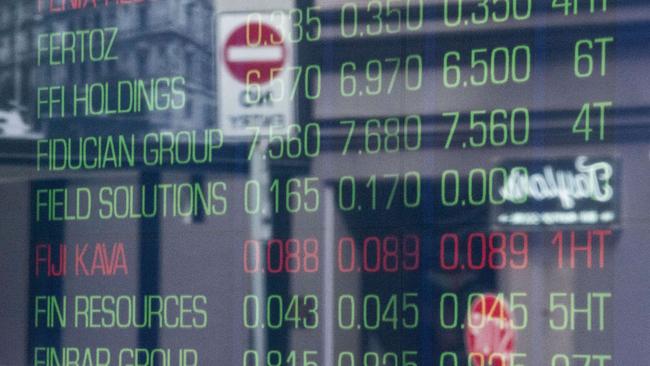Money off table as global recession rears head
Investors wiped $42bn off Australian shares as higher-than-expected US CPI data stoked fears of rampant inflation fuelling aggressive rate rises that may cause a global recession.

Business
Don't miss out on the headlines from Business. Followed categories will be added to My News.
Investors wiped $42bn off Australian shares as higher-than-expected US CPI data stoked fears of rampant inflation fuelling aggressive interest rate rises that may cause a global recession.
The Australian dollar and shares tumbled along with commodities, while safe havens including government bonds were in demand as risk aversion permeated global markets after a brief respite.
After breaking below US70c earlier this week as the US dollar index hit a two-year high amid rapid-fire US interest rate hikes and a sustained fall in commodities, the Aussie dollar tumbled 0.9 per cent to a 22-month low of US68.73c amid renewed falls in iron ore, copper and oil.
As well, the local sharemarket saw sustained selling from global investors who recently favoured Australian equities for commodity exposures as the Ukraine war disrupts supplies.
The S&P/ASX 200 index tumbled 135 points, or 1.9 per cent, to a fresh three-month low of 6939.2, before closing down 1.8 per cent at 6941 points. Information technology was easily the worst performing sector after Macquarie warned of a “painful reset” and Xero results disappointed.
A potential meltdown in cryptocurrencies appeared to spill over to other risk assets as bitcoin dived to a 2½-year low of $US25,424 after breaking decisively below $US30,000.
The ASX 200 has fallen 9 per cent in three weeks. The 12-month forward price-to-earnings ratio of the index has plunged to a two-year low of 13.85 times, from a record high near 21 times in late 2020. This valuation measure is 12 per cent below the decade average and earnings estimates are rising.
Meanwhile the bond yield curve “bull flattened” despite the higher than expected US CPI.
Long-term yields fell more than short-term yields, suggesting markets may have reached “peak bearishness” on the pricing of central bank interest rate rises as recession risks increased.
The Australian money market had priced in an RBA cash rate of 2.77 per cent by the end of the year, versus 0.35 per cent now, but year end cash rate pricing has fallen from almost 3 per cent recently.
The higher than expected CPI leaves the US Federal Reserve facing a “delicate highwire act” as it tries to get inflation back on track without tipping the economy into recession, according to GSFM investment strategist Stephen Miller.
The chance of the eurozone avoiding a recession if the European Central Bank starts to lift rates in July, as indicated by senior ECB officials, was “even more improbable”.
Miller expects sustained volatility in financial markets as investors assess the chance of the Fed reining in inflation without risking a “substantial economic dislocation” or recession, with the prospect of an extended Ukraine war and fallout from China’s Covid lockdowns adding to the risks.
Indications of a peak in US core inflation are “about it as far as the good news is concerned”.
That’s “nowhere near enough to take the pressure off the Fed”, and even current market pricing of aggressive Fed rate rises fails to reach a positive real (inflation-adjusted) Fed funds rate. “In other words, real policy rate yields are forecast to remain low when judged by historical standards,” Miller said.
“On that basis it is difficult not to see an escalation of the Fed’s recent hawkish communication.”
That looked to be the case on Wednesday, with Atlanta Fed president Raphael Bostic saying he was open to “moving more” on rates to tame inflation
The Donald Trump-appointed Fed board member Chris Waller went further: “I don’t care what the reasons are, inflation’s too high, and my job is to get it down. If we get some help from supply chain resolution, that’s fantastic, but I’m not counting on it.”
Miller – who previously served as head of fixed income at BlackRock – noted that the gap between the US 10-year bond yield and annual core inflation (the “trailing real 10-year yield”) was about minus 3.2 per cent at the end of April, still very low by historical standards.
“Apart from the recent post-pandemic period, and perhaps fleetingly in 1980, the trailing real yield is at levels that were last seen in the mid-1970s,” Miller said.
“In the three years leading up to the onset of the pandemic, US 10-year real trailing yields averaged around 0.4 per cent – still very low in historical terms.”
Australian sharemarket outperformance should continue in a global sell-off triggered by rising interest rates while inflation remains unacceptably high, according to Russel Chesler, head of investments and capital markets at VanEck.
“With inflation sitting at a 40-year high, equity markets are on edge as the Fed moves into an aggressive monetary tightening cycle, unwinding the huge amount of monetary stimulus we’ve seen in recent times,” Chesler said. “That has fuelled concerns about an impending global recession, and possibly stagflation, which remains a possibility with energy prices remaining high.
“We could see shares weaken further with the risk that inflation keeps shooting higher.”
Chesler argued that the US market – dominated by mega-cap growth stocks – was especially vulnerable to higher inflation and interest rates.
But with inflation and commodity prices rising so quickly, he stuck to his view that the local market should outperform, led by the large resources companies.
Canaccord also saw a buying opportunity in the Australian metals and mining sector.
“Looking through the short-term volatility, we see the recent pullback as an opportunity to invest in sector leaders with robust balance sheets and near-term earnings growth/positive free cashflow yields, particularly those with leverage to attractive long-term supply/demand fundamentals such as Allkem, Lynas Rare Earths and OZ Minerals,” said Canaccord analysts.
Originally published as Money off table as global recession rears head





